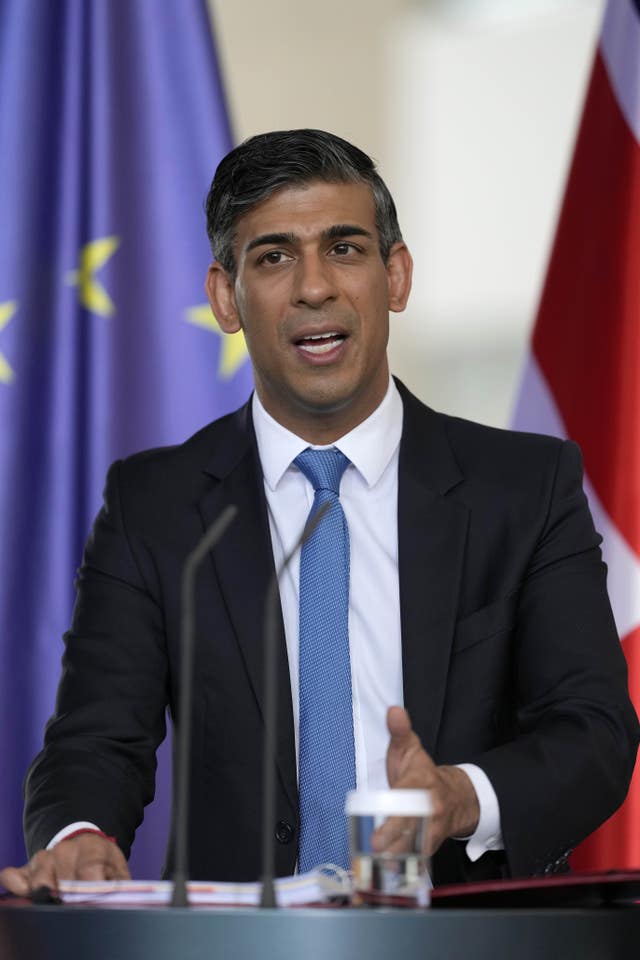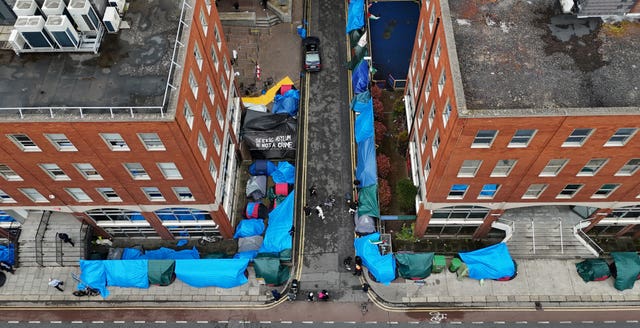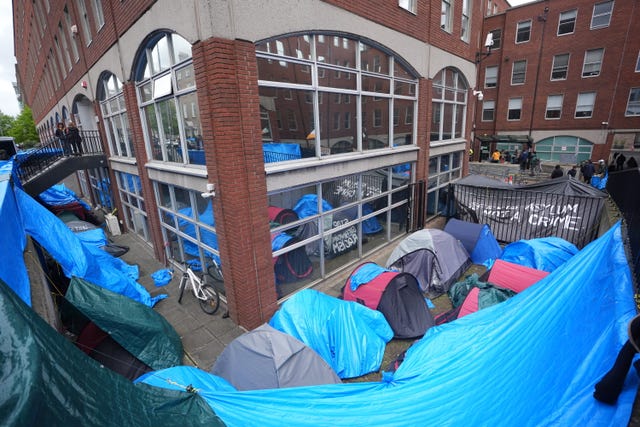The Irish Department of Justice has refused to publish an operational arrangement which it says provides for returning asylum seekers to the UK.
It comes amid a developing row between Ireland and the UK after the Irish justice minister said there was a significant increase in the number of asylum seekers arriving in Ireland from across the Northern Ireland border.
After it was suggested the increase could be driven by migrants fearing the UK’s Rwanda plan, UK Prime Minister Rishi Sunak said that showed the plan’s effect.
The policy aims to send asylum seekers to the east African nation to deter others from crossing the English Channel.
Irish premier Simon Harris said on Sunday that Ireland will not “provide a loophole” for other countries’ migration “challenges”, while Mr Sunak said it was “not interested” in any returns deal if the EU does not allow the UK to deport asylum seekers who had crossed the English Channel to France.
The existence of an “operational arrangement” at the centre of the UK-Ireland diplomatic row has been acknowledged by both sides, but Downing Street has cast doubt on whether it contains any legal obligations.
A No 10 spokesman said: “There’s an existing understanding and operational procedure that is long standing with the Irish government.

“It’s obviously consistent with the Common Travel Area, but there is no legal obligation to accept the return of asylum seekers who enter and cross the Common Travel Area.
“My understanding is no asylum seekers have ever been returned to the UK under these existing arrangements. And as the Prime Minister set out yesterday, we’re not going to accept returns from the EU via Ireland at a time when the EU doesn’t accept returns back to France.”
Mr Sunak’s official spokesman added that the UK worked with Ireland on the sharing of biometric data on individuals claiming asylum, “clamping down” on visa abuse and dismantling smuggling gangs.
The Irish Justice Department said the written deal with the UK Home Office was agreed in November 2020 but is not publicly available.
It said the deal provides for reciprocal returns of asylum seekers who are deemed “inadmissible” and helps to protect against abuse of the Common Travel Area.
However, it refused to publish the deal: “We do not provide operational details of immigration procedures so as to avoid any impact on the effectiveness of such operations.”
On Tuesday, the Irish Government approved emergency legislation from the Minister of Justice Helen McEntee to allow the UK to be designated as a safe country to enable asylum seekers to be transferred back there.
It comes after a High Court ruling in March deemed that the legal basis for designating the UK as a safe country for the return of asylum seekers was unsound under EU law.

Mr Harris said the justice minister has acted swiftly to address this High Court ruling.
Asked about agreements with the UK, she said the reciprocal arrangement is to ensure that “neither of our countries are a place for people to evade or obstruct” the immigration controls and processes of the other.
“To combat any abuse of the CTA, it is essential that we have mechanisms in place to return people to the UK where the UK is deemed to be the appropriate country to process any application for protection,” the minister said.
“It hasn’t been operational owing to a High Court judgment which identified a legal issue which had a bearing on the operation of that arrangement.
“The legislative changes that I will bring to the Houses in the coming weeks will ensure that the arrangement can be operationalised.”
The Irish Government has been accused of displaying “incredible incompetence” over migration issues by the leader of opposition party, Sinn Fein.
Party leader Mary Lou McDonald told the Irish parliament: “At a time when we need calm and an assured response, we get panic. At a time when we need competence and clear communication, we get contradiction.
“This has been a feature confirming the widespread view that your Government is not on top of issues relating to migration, that nobody competent is in charge.
The incompetence is off the charts!The government's chaotic approach to immigration hits another level.
Confusion and contradiction within government – Justice Minister Helen McEntee says one thing and Tánaiste Micheál Martin says another.
Confusion and contradiction between… pic.twitter.com/542qjk3g5y
— Mary Lou McDonald (@MaryLouMcDonald) April 30, 2024
“Scrambling around to turn hotels, B&Bs, office blocks into Direct Provision centres or having tents line the length of Mount Street in Dublin are not the hallmarks of a well-managed system.”
She added: “Your government says that you have an agreement with Britain, the British government saying that you do not. Which is it? If you do have such an agreement, has the Irish state made use of this agreement?
“You’ve actually managed to spread this confusion now to between two governments, about an agreement which exists or does not exist. Which is it?”
Mr Harris denied there was any confusion, saying there is a Common Travel Area between the United Kingdom and Ireland.
“As you know, better than most I would imagine, that is a really important Common Travel Area,” Mr Harris added.
“It’s something we value and as you also know, that when Britain made the decision to leave the European Union there was an agreement put in place, one that indeed has been confirmed by the British Government today in relation to an operating agreement for migrants, for refugees to be returned in both directions.

“I have no intention whatsoever of this country being dragged into politics in Britain, I’m very well aware of politics in Britain, they can have their migration policy, and they can do what they wish in relation to that.
“We have ours and ours is a rules-based firm migration system that endeavours to provide assistance to people in humanitarian need, but also one that has to make it clear to people that if they don’t have a right to be here, that they need to be asked and leave more quickly.”
Mr Harris added: “We also have every right when countries enter agreements, that those agreements are honoured. This is a country that honours our agreements and I’ve said very clearly that the British Government has acknowledged that there are operational arrangements in place. I welcome that fact.
“I’m very clear that those operational agreements are in place under the Common Travel Area. And I’m very clear that we’re going to legislate to have absolute clarity so that it can work. But I’m also really clear that it’s only one of a number of things we need to do.”
Labour leader Ivana Bacik said the Government’s immigration plan has “failed”.
“The clearest evidence of that failure is just around the corner. Hundreds of people sleeping in tents and makeshift shelters in desperately unsanitary conditions on Mount Street,” she added.
There has been an increase in the number of asylum seekers arriving in Ireland in recent years, with up to 16,000 new arrivals projected to arrive every year, up from between 3,000-5,000 between 2015-2019.
As Ireland struggles to boost housing supply after falling behind during the economic crash, the influx has put more pressure on the State to house people as their asylum claim is processed.
The Irish government has implemented a number of migration policies in recent weeks, including paring back the offering to Ukrainian refugees who are automatically granted asylum.
A makeshift camp has sprung up at the International Protection Office in Dublin city as more than 1,700 asylum seekers have been left without an offer of accommodation from Ireland.




Comments: Our rules
We want our comments to be a lively and valuable part of our community - a place where readers can debate and engage with the most important local issues. The ability to comment on our stories is a privilege, not a right, however, and that privilege may be withdrawn if it is abused or misused.
Please report any comments that break our rules.
Read the rules hereLast Updated:
Report this comment Cancel